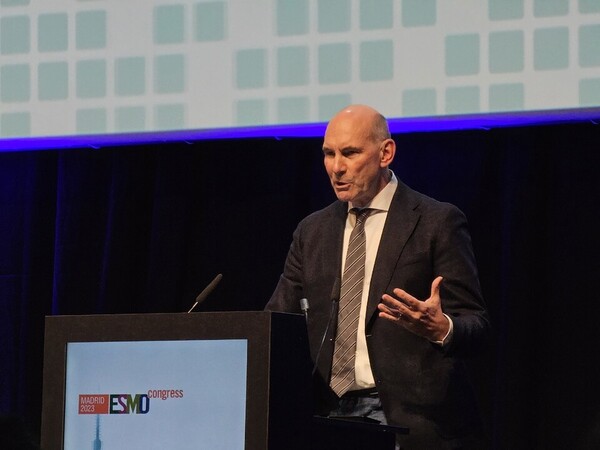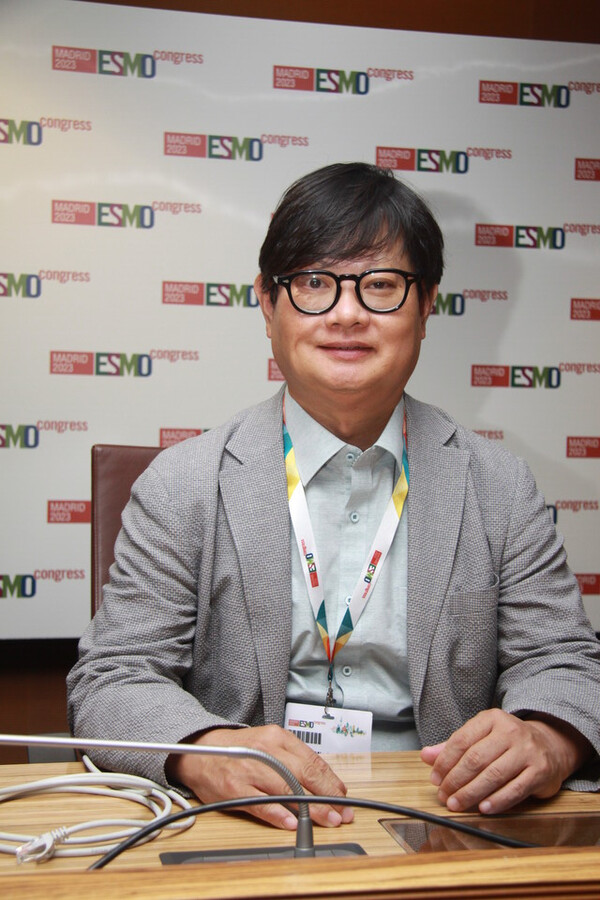
MADRID -- By Kim Chan-hyuk Korea Biomedical Review correspondent -- MSD's anti-PD-1 immuno-oncology drug Keytruda (pembrolizumab) has solidified its position as a first-line treatment with new long-term follow-up results in patients with HER2-positive advanced gastric cancer/gastroesophageal junction (GEJ) adenocarcinoma.
Following the KEYNOTE-859 trial in HER2-negative patients, Keytruda demonstrated a survival benefit in KEYNOTE-811 in HER2-positive patients, making it the preferred treatment option in the first-line treatment of stage 4 gastric cancer, regardless of HER2 status.
The results of a clinical study (KEYNOTE-811) to evaluate the effectiveness of the combination of Keytruda, Herceptin (trastuzumab) and platinum-based chemotherapy in patients with HER2-positive advanced gastric or gastroesophageal junction adenocarcinoma were presented at the European Society for Medical Oncology Annual Congress (ESMO 2023) at the Ipema Convention Center in Madrid, on Friday (local time).
The primary endpoints were progression-free survival (PFS) and overall survival (OS), and the data supported MSD's European Commission (EC) approval of the Keytruda combination in August for the first-line treatment of adult patients with unresectable locally advanced or metastatic HER2-positive gastric or GEJ adenocarcinoma with PD-L1 (CPS ≥1) expression.
After a median follow-up of 28.4 months, the Keytruda combination achieved a statistically significant improvement in PFS in the overall intent-to-treat (ITT) population with a 28 percent (HR=0.72 [95 percent CI, 0.60-0.87]; p=0.0002) reduction in the risk of disease progression or death compared to trastuzumab and chemotherapy alone (the placebo arm).
The Keytruda combination also demonstrated a clinically meaningful improvement in PFS in patients with PD-L1 (CPS≥1) expression, reducing the risk of disease progression or death by 30 percent (HR=0.70 [95 percent CI, 0.58- 0.85]) compared to trastuzumab and chemotherapy alone.
Notably, according to Dr. Florian Lordick, University Cancer Center Leipzig, Germany, who presented the results of the follow-up interim analysis, at a median follow-up of 38.5 months, the mPFS was 10 months (8.6-12.2) in the Keytruda arm and 8.1 months (7.1-8.6) in the placebo arm, with the combination reducing the risk of disease progression or death by 27 percent (HR=0.73 [95 percent CI, 0.61- 0.87]).
Compared to the placebo, OS showed a favorable trend in the overall patient population (HR=0.84 [95 percent CI, 0.70-1.01]) and in the subgroup with PD-L1 (CPS ≥1) expression (HR=0.81 [95% CI, 0.67-0.98]). OS did not reach statistical significance during this interim analysis, and follow-up is ongoing.
Among patients with PD-L1 (CPS ≥1) expression, the median OS was 20.0 months (95 percent CI, 17.9-22.7) for patients receiving the Keytruda combination, compared to 15.7 months (95 percent CI, 13.5-18.5) for patients receiving trastuzumab and chemotherapy alone.
"Previous studies have shown that PD-L1 is co-expressed in most patients with HER2-positive G/GEJ tumors," Professor Rodig said. In June, the U.S. Food and Drug Administration (FDA) narrowed the indication for Keytruda combination therapy to patients with PD-L1 CPS 1 or higher.
"These results further demonstrated the clinical benefit of Keytruda in combination with trastuzumab and chemotherapy and confirmed a reduced risk of disease progression or death in patients with advanced HER2-positive gastric cancer with PD-L1 CPS 1 or higher," said Yelena Y. Janjigian, M.D., of Memorial Sloan Kettering Cancer Center, global principal investigator of the KEYNOTE-811 study.
‘Keytruda shows significant PFS and OS differences with long-tail effect’

Speaking on the sidelines of ESMO 2023, Ryu Min-hee, a professor of medical oncology at Asan Medical Center, commented on the Keytruda combination, saying, "Until now, only trastuzumab has been effective as a first-line treatment for HER2-positive disease, but additional agents have become available for the first time in 10 years."
"The longer follow-up with the combination has allowed us to discuss three-year survival. The data shows that the 30 percent risk reduction is maintained in long-term follow-up. We saw a significant PFS difference in patients with a PD-L1 CPS of 1 or higher," Professor Ryu said.
Although the final analysis is incomplete for OS, we saw an increase of 4.3 months in patients with a PD-L1 CPS of 1 or higher, which is significant in metastatic patients. In absolute numbers, we can say that we saw a difference in the survival curve, he added.
"At two and three years of follow-up, the survival curves continue to diverge between the two groups (combination and placebo)," he said, adding that the addition of the immuno-oncology agent demonstrates a "long-tail effect" (prolonged survival with no worsening of symptoms after treatment).
Professor Ryu commented on the inclusion of Keytruda in European guidelines, "Its description in guidelines means it is also recommended in real-world clinical practice. Of course, the availability of the drug depends on insurance coverage."
Regarding domestic approval, he said, "Currently, it is only approved in the United States and Europe, but we expect it to win approval in Korea soon. Even after approval, if it is too expensive, patients will be unable to use it, so insurance coverage is the key."
Ryu noted that about 15 percent of metastatic gastric cancer patients in Korea are HER2-positive.
"One of the features of this Keytruda combination therapy is that there was no significant increase in side effects, so it is a fairly safe treatment. We look forward to its approval and reimbursement in Korea as soon as possible."
Related articles
- Korea-led Keytruda clinical trials to add option for stomach cancer
- Keytruda’s reimbursing attempt for 13 indications fails to surmount 1st hurdle
- MSD Korea applies for reimbursing all 13 indications of Keytruda. Will it lead to a new coverage model?
- [ESMO 2023] Global competition for anticancer therapies opens yearly event in Europe
- [ESMO 2023] Lunit, Medpacto, TiumBio present research results at ESMO 2023
- [ESMO 2023] Keytruda-Padcev combo takes 'crown’ as 1st-line cure for urothelial cancer
- [ESMO 2023] Yuhan's NSCLC drug Leclaza shows potential as 1st Korean blockbuster drug
- [CPHI 2023] Prestige Biopharma embraces open innovation for new antibody drugs
- [ESMO 2023] GI Innovation lays ground for Keytruda’s clinical trials

